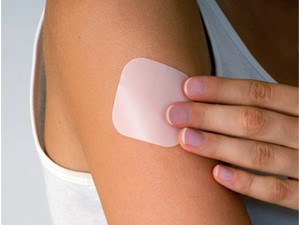Injection, Patch and Implant
The implant is a small 4cm flexible tube containing the hormone progestogen, which is inserted under the skin of the upper arm. It lasts for three years, but can be removed at any time and your fertility will return to normal very quickly.

The contraceptive injection also contains progestogen and protects you against pregnancy for eightweeks or 12 weeks, depending on the type you use.
The patch is a sticky patch measuring 5cm x 5cm (similar to a nicotine patch), which delivers oestrogen and progestogen into your body through your skin. Each patch lasts for one week. You wear them for three weeks, then have a week off.
How does it work?
All three usually stop ovulation (the release of an egg), thicken the cervical mucus and thin the womb lining. This makes it harder for sperm to move through your cervix, and less likely for any fertilised egg to implant in your womb.
How effective is it?
If used correctly, all are more than 99% effective. Less than one woman in 100 will get pregnant in one year.
Added Benefits
> You don't need to think about contraception every day, and they are still effective if you vomit or have diarrhoea.
> The implant and injection are useful for women who can't have oestrogen.
> If you have side effects, you can have the implant taken out, although the injection will take time to work through your system.
> With the patch, you don't have a period. Instead, you have a monthly 'withdrawal bleed' during the week off, which can be lighter and shorter than a period. So if you have heavy or painful periods, the patch can help. With the implant and injection periods may stop altogether.
What else should I know?
> With all three your periods may become irregular, lighter, heavier or longer.
> A common side effect of the implant and injection is that your periods stop altogether. It's not harmful, but you may want to consider this.
> None of these three methods of contraception protect against sexually transmitted infections (STIs) so condoms should be used as well to protect against STIs.
Implant
> When the implant is first put in, you may feel some bruising, tenderness or swelling.
> The implant’s effectiveness can be affected by some medicines, such as for HIV or epilepsy, or homeopathic remedies such as St John's Wort. Ask your doctor for more details.
Injection
> Side effects for the injection can include weight gain, headaches, mood swings, breast tenderness and irregular bleeding.
> The injection works for 8 or 12 weeks. It can't be removed from your body, so if you have side effects, they will persist during these weeks, and for some time afterwards.
> It can take up to one year for your fertility level to return to normal after the injection wears off, so it may not be suitable if you want to have a baby in the near future.
> Using the Depo-Provera injection affects your natural oestrogen levels, which can cause thinning of the bones. This is not usually recommended for women under 19 as their bodies are still making bone until this age.
Patch
> The patch can increase blood pressure, and chances of blood clots. Some women get temporary side effects, such as headaches.
> The patch has to be changed every week, but you can wear the patch in the bath, in the swimming pool and while playing sports.
> The patch is not suitable for all women.
You can find out more about these methods of contraception on the NHS website: www.nhs.uk/conditions/contraception/
By using condoms as well as other contraception, you'll help to protect yourself against sexually transmitted infections (STIs).
